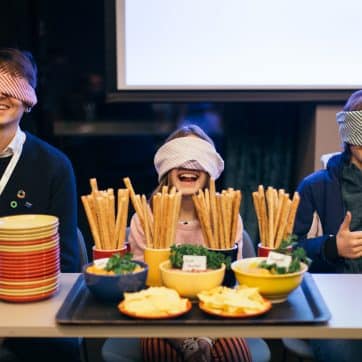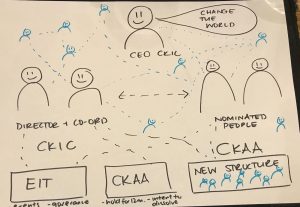Experiments

After an intense but exciting past year, it’s nice to start 2019 with some exciting projects.
By Dorka Bauer, first published on 16 January 2019
I must say that the community design team felt relieved after presenting our ideas about the new community structure. Loads of projects ahead but we really feel motivated, inspired and ready for the challenges. It is not a quick fix strategy the team has sketched so we will definitely need the time to plan and execute. There were many questions we could not simply answer by research and interviews, so in order to answer these and construct a structure that suits our community the best, we will experiment. In this blog post, I will show you some of the first experiments the design team set up.
Probably one of the most important lessons I learnt during the interviews was that there is no one size fits all community structure, each and every group needs a different system in place. The best way to find out our system’s unique features is to start trying out different things. We have already understood the need for a more dynamic, open, action-focused and self-organising structure that allows climate action. So based on those criteria, the design team has sketched an “organigram” (see below) to help visualise what we think could become the model for us.

The model we are experimenting with is moving away from hierarchical structures, and we are creating a community where people are responsible for each other. Projects are not decided by a board or higher entity, but rather collectively by the community.
My research findings underlined that a good communication platform is also essential for a good structure. My inbox and Facebook has been overloaded with emails and messages coming from the community. I always found it difficult to collaborate on these platforms. Therefore, I think finding the right communication platform could contribute to building more effective partnerships and projects. So now we are also experimenting with Slack.
Through Slack, every community member can be part of the experiments. There have already been some channels established, so we can start building some of the tentative projects for next year, such as our attendance at Sziget Festival. At the Heroes’ Reunion in Vienna (November 2018) we asked you how many of you have plans or unfinished projects. The majority of the attendees indicated that there are many projects you want to move forward with. The Slack experiment helps to bring your ideas, embrace and execute them with other community members. Who knows, this might be the perfect platform for us?!
So how does experimentation work? We will experiment through designing 3–4 months long ‘sprints’. Sprints are short and sharp experimentations for fast learning.
The outline of a sprint is: choosing a theme, planning and researching, implementing and evaluating. These sprints will allow community members to pitch and implement ideas. We will co-create solutions on social media, as well as at festivals like Sziget. The sprints will be a great way to learn and see where our community can really make an impact.
The research team has presented the ideas that were introduced to the community in Vienna (November 2018) to the community and later on to Climate-KIC. The design plans were welcomed and we got the approval to proceed with both the experimentation as well as the deeper structural examination and reconstruction of the Alumni Association.
What the design team needs now is time and energy to be able to really build a structure that allows systemic change, while building an outstanding community that can catalyse climate action. So don’t forget to register to our Slack channel, and bring you ideas, no matter how big or small they are, it’s your chance to build your dream projects and experiment in the Climate-KIC community!
